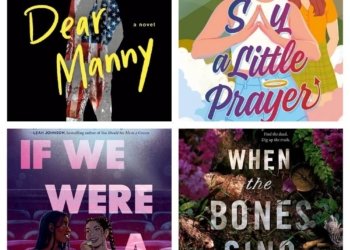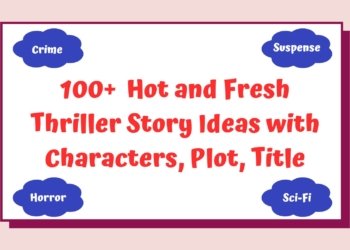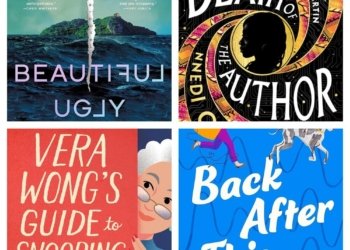No products in the cart.
A Conversation with Christina McDonald, a Mystery, Thriller Author
Christina McDonald is the USA Today bestselling author, her writing has been featured in The Sunday Times, Dublin, USAToday.com, and Expedia.
845
SHARES22.3k
VIEWSChristina McDonald is the USA Today bestselling author of Do No Harm, Behind Every Lie and The Night Olivia Fell (Simon & Schuster/Gallery Books), which has been optioned for television by a major Hollywood studio. Her writing has been featured in The Sunday Times, Dublin, USAToday.com, and Expedia. Originally from Seattle, WA, she has a BA in Communications from the University of Washington and an MA in Journalism from the National University of Ireland Galway. She now lives in London, England with her husband, two sons, and their dog, Tango. She’s currently working on her next novel.
Christina enjoys reading, hiking and lifting weights at the gym. She always wanted to be a writer, and told her earliest stories to her two younger sisters, who were her first audience, cheerleaders and sounding board. She has a BA in Communications from the University of Washington, Seattle and an MA in Journalism from the National University of Ireland, Galway.
Let’s get started with a quick rapid fire.

Q1. If you could be transformed into one mythological creature, which one would you choose?
Unicorn.
Q2. What time do you usually go to bed at night?
11 p.m. But I have to read for at least a half hour first.
Q3. What are the least-likely three words someone would use to describe you?
Lazy, Unkind, Stupid.
Q4. Where did you go on your last vacation?
Amsterdam.
Q5. Would you rather find your dream job or win the lottery? You can’t do both.
Dream job.
Q6. What is one thing you regret spending money on?
Nothing. I’m very careful how I spend money.
Q7. What object do you misplace or lose the most?
My phone.
Q8. If you were a spy, what would be your codename?
Big Mac.
Q9. What secret about the universe would you most want to learn?
How to still time.
Q10. What never fails to make you laugh?
Babies giggling. “Self-doubt and fear are sort of a buy-one, get-one-free package.”Christina McDonald, Behind Every Lie
It’s time for a more detailed conversation, Christina.
You’ve answered our rapid fire brilliantly, Christina. Now, it’s time for our readers to know more about the person behind the book.
Q. Tell us about your journey.
I started my professional life as a journalist after I got my MA degree in Journalism in Ireland. But my passion was always writing fiction and, to be honest, I was more interested in making up stories than telling true stories, and that is very frowned upon as a journalist! So I started writing in my spare time.
I wrote my first book in 2011 and after submitting to nearly 100 agents, got an agent. But that book didn’t get a publishing deal. I wrote a second book that was also rejected, and then a third book – The Night Olivia Fell. With Olivia I got a new agent and then signed a two-book deal with Simon & Schuster. Olivia published in 2019, three years after signing with my agent, and eight years after I first started writing. Behind Every Lie followed the year after that. But I quickly learned that it isn’t getting published, but staying published, that is the hardest part. After my third book with my publisher, Do No Harm, I was dropped during the pandemic.
Publishing was hard during that time in general and it took me a while to bounce back from getting dropped, but I did. I wrote These Still Black Waters, which sold to Thomas & Mercer and publishes in October 2023. “But there are no redos in life. You can’t go back and make things better. All you can do is live with it and move forward.”Christina McDonald, The Night Olivia Fell
Q. So, what books have you read more than once in your life?
Umm, none? Maybe I shouldn’t admit it, but I never read books a second time.
Q. Interesting. Who has been the biggest supporter of your writing?
My husband, Richard, is the biggest supporter and always my first reader. Even before I send my books off to my agent or my editor, I get his take on the story; if it makes sense, if he gets emotionally invested, etc.


Q. Do you hide any secrets in your books that only a few people will find?
Not secrets, exactly, but of course things in my life can seep into my writing. Often not even consciously.
Q. Now comes the most anticipated question that every author must answer. How do you process and deal with negative book reviews?
Easy. I don’t read them! Books are so subjective, and people can have vastly different responses. And there’s nothing good that comes from me reading them. I can’t change anything by the point where a reviewer is reading, so there’s nothing I can take away that will make my writing better. I stick to feedback from my editor for that.
Q. What comes first for you — the plot or the characters — and why?
This varies vastly. Sometimes a character appears to my almost fully fleshed-out first and sometimes plot. For These Still Black Waters, Neve, one of my protagonists, came to me fully formed. But for the second book in the series (the one I’m currently writing), it began with plot and the characters all formed around that. “You don’t have to be right one hundred percent of the time to show you love someone.”Christina McDonald, The Night Olivia Fell
Q. How do you develop your plot and characters?
I try to start with plot because that’s where the hook comes from. But characters influence the plot and plot influences the characters. The way I write is completely organic and develops from day to day. I don’t plot or have an outline that I write from. I simply show up at my desk day after day and spin stories.
In general, I make sure my characters have a character ghost – something that haunts them from their past. That character ghost informs their internal need. That internal need drives their external need, which is the plot.
Q. You got 100 points. You need to divide them on the basis of how relevant and important they are to you as a reader and a writer for your book or someone else’s as a reader. Your options are Plot/Story, Book Cover, Marketing, and, Reviews.
Not really sure, but I’ll give it a go as a writer:
Plot/Story – 25
Dialogues – 20
Book Cover – 15
Marketing – 30 Reviews – 10

Q. So, now, about your book. Talk to us about it. No major spoilers.
These Still Black Waters is about two women struggling toward a dark truth as a serial killer avenges the sins of the past. It follows Neve Maguire, who returns to Black Lake, her childhood summer home, hoping for a fresh start after a violent home invasion. But when the body of a woman is found floating in the lake behind her house, she fears she’s made a terrible mistake.
The detective assigned to the murder is Detective Jess Lambert. Recently back after her own personal tragedy, Jess is sure Neve is hiding something. And when another woman’s body is found, they are both forced to confront a horrible truth.
Q. What part of the book did you enjoy the most while writing?
I always enjoy writing the last 25% of the book, where everything comes together, and it feels like pure adrenaline when I’m writing. It’s a kind of buzz I haven’t found anywhere else and I love it.
Q. What is your kryptonite as a writer?
Reading reviews. Which is why I don’t read them.
Q. Would you and your main character get along in real life?
I think I would get along with both of my main characters, Jess and Neve. They’re very different, and yet they’re both survivors haunted by their past, and they’re also strong, confident women.
Q. What risks have you taken with your writing that have paid off?
I think just submitting to agents is a risk because most of the time, and for a long time, you deal with so much rejection. But it’s paid off for me in that I’m published now.
Q. Let’s talk about the process of writing. Do you do research while writing a book to add more authenticity? What kind of research?
It depends wholly on the book. My last book, Do No Harm, had a lot of research involved because it was based on a medical process, as well as the pharmaceutical drug industry in America. However, These Still Black Waters didn’t require as much.
Q. What was your hardest scene to write?
The middle is always the hardest part. I tend to second guess myself a lot by that stage, wondering if I’m on the right track and if people will enjoy it. But once I push on, I get over it. “The past may be dead, but it’s our choice if we bury it.”Christina McDonald, These Still Black Waters
Q. Well, this has been great. Now, before we wrap this up, do you have any suggestions to help someone become a better writer? If so, what are they?
Most authors don’t just become successful one day. We usually have a lot of manuscripts that ended up in the trash, a lot of rejections, from agents, publishers, editors, and a lot of self-doubt that comes from that. The best advice I can give to any writer is to keep writing. Keep gathering all of your life experiences to put those into your craft. Keep practicing and be persistent. And while you’re doing that, get to know other writers in your genre. These are the people who will support you along the way.
UPDATE:- Her book, These Still Black Waters will be available on Amazon starting August 08, 2023.
Related Posts
8 Most Anticipated Young Adult Books of Spring 2025
As the days grow longer and the air warms with the promise of spring, the literary world awakens with a...
100+ Bestselling Thriller Novel Story Ideas for 2025
Welcome, aspiring authors, to the thrilling universe of storytelling where your next bestseller is just a spark of inspiration away!...
10 Most Anticipated Books of 2025
As the chill of winter melts away and the promise of spring begins to bloom, March 2025 brings with it...
10 Must Read Romance Novels of 2025
Is it possible for a bookworm to browse the bookshop or browse social media without being overwhelmed by romance fantasy...
About Us

Trenzle
Where Trends are made and discovered
Trenzle is your official source of discovering the latest people, work, and ideas that deserve to trend. Discover Authors and their books, Creators and their work, People and their opinions, and Stories from around the globe.
Learn more
Latest Posts
8 Most Anticipated Young Adult Books of Spring 2025
March 12, 2025
100+ Bestselling Thriller Novel Story Ideas for 2025
March 7, 2025
Categories
© 2023 Trenzle - Online Author News & Magazine










